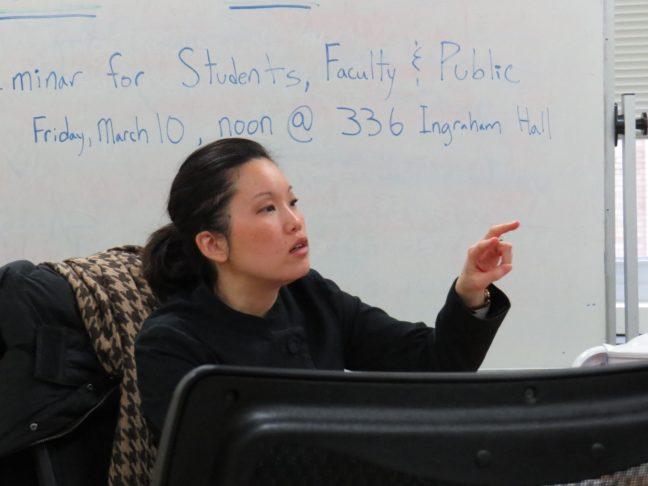As analysts work to explore the nation’s current political and social climate, political science expert Natalie Masuoka unpacked her studies of attitudes toward immigrants and how those attitudes vary across different racial groups.
Masuoka, a professor and director of Asian-American studies at Tufts University, said this topic is especially pertinent following the 2016 presidential election. At an ongoing lecture series that seeks to address how racial politics have shifted in the 21st century, Masuoka focused on the diversity she said is often masked in national surveys of public opinion.
At least half of Americans would prefer immigration be decreased and less than a quarter think it should be increased according to polls conducted during the 2000s, Masuoka said.
“[These figures] tend to paint a picture that Americans are not necessarily very aggressively interested in increasing the size of immigrants in the United States, and actually lean much more toward an anti-immigrant stance or, at minimum, a more cautious stance,” Masuoka said.
Executive order impacts students, faculty, researchers on campus, forcing many to speak out
This data, however, varies when broken down by racial groups, with more minorities showing greater support for immigrants, Masuoka said. Asians and Latinos also showed the greatest support for providing government social services to all immigrants, while whites showed the least.
While political scientists often hypothesize this anti-immigrant sentiment stems from perceived economic threats, cultural threats and racial prejudice, Masuoka said she wanted to explore how racial and national identities affect people’s opinions.
“Rather than thinking about these ideas of threat, instead, [we’re] thinking about the mechanism of group identity as a more appropriate way to understand anti-immigrant attitudes,” she said.
Muslim students and allies discuss impact of election results
Masuoka said different groups have different histories that partially determine how they shape their national identity. Historical experiences and decisions made white people a privileged group that defined what it meant to be American, while non-white people had a history of being excluded from full citizenship based on race.
This historical exclusion contributes to how minorities tend to think about their national identity today. Masuoka said though national and racial identity often align for white people, racial minorities tend to feel more tension between the two.
Masuoka said she and her co-author expected to see tension between strong racial and national identities affect people’s opinions on immigration — though it doesn’t always predict those attitudes.
“High racial identity really makes racial minorities think about inequities in the United States, that there are various processes of discrimination, and so those perceptions actually likely mediate their response to immigrants and might actually make them more inclusive,” Masuoka said.
Madison Latino community gathers in support after presidential election
How these identity factors played into the presidential election is yet to be known, she said.
President Donald Trump’s campaign changed how political scientists think about politicians’ narratives on race, Masuoka said. He appealed to both a strong national sense of identity and spoke explicitly about race.
“What I thought was really interesting and what was very well publicized was how explicitly racialized Trump talked about immigration and how we should treat new members of society,” Masuoka said.
In the past, politicians spoke about race in coded language with words like “urban” and “inner city,” she said. In this campaign, however, Trump blatantly called Mexican immigrants rapists and murderers, but didn’t suffer political backlash.
Masuoka said one promising possible method for addressing prejudice in the future is to draw attention to this coded language and point out racial undertones which then allow people to “self-correct.”
“It’s really important, actually, for Americans to feel they’re not racist and they’re not violating a norm of equality, so when you offer these explanations about what these strategies are doing to your attitudes, we see these self-corrections,” Masuoka said.


















